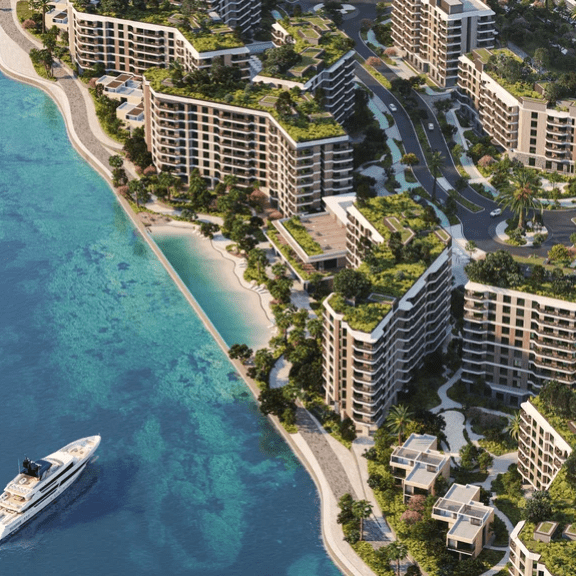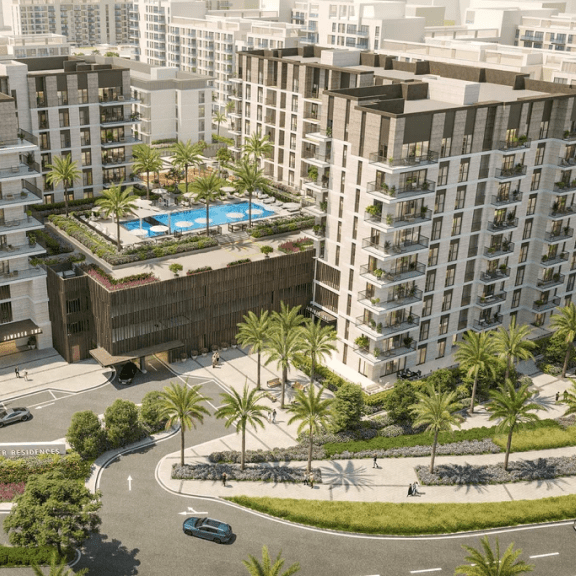In global cost of living rankings, the UAE doesn't even make it into the top 20. Living in the Emirates is more affordable than in the USA, Israel, Japan, and most Western European countries, but it's still more expensive than in Russia, Eastern Europe, Africa, and Southeastern Asia. In this article, we will provide insights into the cost of living in the UAE and break down its components.
Where to Live in the UAE
The cost of living in the UAE varies depending on the emirate. The top-ranking emirates in this regard are Dubai and Abu Dhabi, while the most budget-friendly option is the emirate of Ajman.
Dubai is the most favored emirate among expatriates from around the world, and for good reason. The emirate offers favorable taxation policies and excellent living and business conditions. The high demand for Dubai has an impact on the cost of living. In late 2022, Mercer published a study ranking Dubai 31st on the list of the world's most expensive cities based on the cost of living.
New buildings in the UAE
How Much is the Rent?
Individuals who do not own real estate in the UAE often allocate a significant portion of their income toward renting a place. Many prominent companies provide housing for their valued employees, but for the majority of residents, rent constitutes a substantial portion of their expenses.
As with any other place, rental costs in the UAE depend on both the location and the category of the real estate. A modern apartment in a downtown skyscraper is more expensive than an apartment on the outskirts.
Azizi Park Avenue (Housearch)
Local renting peculiarities include the following:
Landlords and real estate agencies often request a year's rent to be paid upfront in a single installment, along with a security deposit. This can significantly impact the financial situation of tenants whose housing is not covered by their employer.
You can access the current rental rates using the Rental Index online service provided by the Dubai Land Department's Real Estate Regulatory Agency (RERA). When entering into a one-year lease contract, which is the most common type, you will be required to cover the real estate agent's commission and a government fee for registering the rental contract (EJARI). For individuals without families, a practical option is co-renting, which is quite common in Dubai, allowing the cost to be shared among several individuals.
The average rental costs in the UAE typically range from 30,000 to 50,000 AED ($8,100 to $13,600) per year for a studio or a modest one-bedroom residence. For one- or two-bedroom apartments, the annual rent can be anywhere between 70,000 and 100,000 AED ($19,000 to $27,220). In the most affluent emirate, Dubai, a luxury one-bedroom apartment could set you back approximately 96,670 AED ($26,317) annually. On the other hand, a more budget-friendly one-bedroom accommodation located outside of downtown might cost around 56,200 AED ($15,300) per year.
Here’s the monthly cost breakdown:
Type of Apartment | Cost of rent per month |
Apartment (one bedroom) in City Center | AED 5,141.89 (USD 1,399.92) |
Apartment (1 bedroom) Outside of CenterApartment (one bedroom) Outside of City Center | AED 3,281.72 (USD 893.47) |
Apartment (three bedrooms) in City Center | AED 9,766.53 (USD 2,659.01) |
Apartment (three bedrooms) Outside of City Center | AED 6,792.74 (USD 1,849.38) |
Another expense to consider is furnishing. Some apartments in the UAE are available for rent fully furnished, while others come empty, requiring you to purchase both furniture and appliances. If your apartment lacks even basic items like a microwave oven, budget at least 10,000 AED ($2,800) for furnishing.
Education Cost
Great news! When compared to the cost of rent, day-to-day expenses in the UAE are relatively more manageable. On average, a family of four can cover their living expenses with a budget of 12,000 AED ($3,000) per month, encompassing rent, groceries, transportation, leisure activities, and dining out.
Families with children should also factor in the cost of education. Regardless of whether your child attends a public or private school, tuition fees are a consideration. Public schools are tuition-free only for UAE citizens, and kindergarten fees are also applicable in the country.
The annual tuition fee for a public school is approximately 6,000 AED ($1,635). Expatriates sending their children to private and international schools can expect to pay between 13,630 and 43,790 AED ($3,700 to $11,922) annually. The specific cost depends on factors such as the school's reputation, its location, and the grade level your child is in. The range of school options is extensive; for example, in Dubai alone, there are over 200 private schools catering to approximately 300,000 expatriate students.
Photo: master1305 (Freepik)
Students in Dubai have the opportunity to pursue higher education at one of the city's 65 colleges, offering a wide range of academic disciplines. These institutions welcome students from both the Emirates and abroad. State-funded higher education facilities primarily conduct classes in Arabic, while most private universities use English as the medium of instruction. International students are typically required to enroll in Arabic language courses. The cost of obtaining a degree varies, with an average of 173,400 AED ($47,209) for a bachelor's degree and between 54,800 and 82,200 AED ($14,919 to $22,379) for a master's degree.
Utilities
A significant monthly expense to factor in is utilities. In Dubai, the rates for electricity and water tend to be on the higher side. On average, you can expect your monthly bills for electricity, gas, and water to total around 600 AED ($163). If air conditioners are used extensively, this amount may increase. Additionally, there is a monthly real estate maintenance fee, which is contingent on the rental amount for the villa or apartment. This fee is calculated at 5% of the rent. For example, if the monthly rent is $1,500, the tenant will need to allocate an additional $75 per month for this fee.
Another expense to consider is your residential Internet access, which typically averages around $100 per month. When you add this to your other utilities, the total cost would amount to approximately $300 to $320 per month, assuming there are two people sharing the apartment.
Cellphone Service
A modest yet essential expense to account for is your cellphone service. In the UAE, the two primary companies offering such services are Etisalat and Du, with Virgin Mobile being a relatively new entrant in the market. Additionally, Etisalat operates a subsidiary service provider called Swyp, which offers plans inclusive of mobile internet access and a network of Wi-Fi hotspots.
The cost of a SIM card typically ranges from $15 to $40, depending on the service provider. For a mobile plan that includes 400 minutes with no distance restrictions and 13 GB of internet data, the average monthly expense is around 200 AED ($55).
Photo: marymarkevich (Freepik)
Medical Expenditures
In Dubai, there is a legal requirement for everyone to have medical insurance. Obtaining a residence permit is contingent on having valid medical insurance coverage. Furthermore, failing to maintain insurance, such as when your previous policy expires without renewal, could result in significant fines. Each month without insurance may incur a penalty of around 500 AED ($135). Failure to settle these fines could jeopardize the renewal of your visa.
Foreigners working in Dubai on a contract basis are entitled to have their medical insurance covered by their employer. However, employers typically do not provide insurance for dependents, such as the employee's family. In such cases, individuals will be responsible for obtaining insurance for their dependents themselves. This also applies to freelance immigrants.
The emirate offers both State-run and private clinics, with the latter constituting approximately 85% of the healthcare market. Foreign residents have access to State-run facilities, just like national citizens, but expatriates typically opt to seek medical care at the clinics covered by their insurance. One key reason for this preference is that the private sector tends to employ a higher number of English-speaking specialists.
To access State medical facilities, foreigners are required to obtain a Health Card. This document can be obtained either in person at one of the Dubai Health Agency's centers or online via the DHA's website.
Photo: freepik
To complete the application, you will be required to submit the following documents:
- Your passport, along with both the original and scanned copies (if your visa is still pending, include your visa application).
- Your Emirates ID and a photocopy (please note that this ID card is mandatory for obtaining a resident visa in the UAE).
- A copy of your real estate lease agreement or your most recent DEWA bill (covering electricity, water, residence, and sewage charges).
- Two passport-sized photos, identical to those used in your passport.
You can obtain a Health Card for both adults and children. Nowadays, expatriates are increasingly opting to secure Health Cards for their children, primarily to access vaccines not covered by their standard insurance plans. The Health Card is initially valid for one year, and it can be conveniently renewed online for an additional year. The pricing structure varies based on different age groups, as follows: from 0 to 10 years of age – 110 AED ($30), 10 to 18 – 210 AED ($57), over 18 – 310 AED ($85).
The Health Card serves as a supplement to your mandatory medical insurance for foreigners, which can come in two forms: basic (EBP) or extended. With a basic policy, the annual claim limit is approximately 150,000 AED ($40,800), covering essential medical services. This includes emergency medical care within the UAE, certain tests, inpatient and outpatient treatments, diagnostics, surgery, and even physical therapy (with a limit of six procedures per year). When opting for a standard policy, the policyholder is responsible for 20% of the medical service costs, provided that their medical bill does not exceed 500 AED ($136) or 1000 AED ($272) per year. Any expenses exceeding these amounts are covered by the insurance company.
The policy provides coverage for 70% of medication expenses, up to a maximum of 1,500 AED ($410) per year per person. During the initial six months, treatment for chronic diseases is not included in the coverage. However, after the first six months, the insurance company begins to cover these expenses.
To get more services at higher quality, consider purchasing an extended individual policy. One of those would cost you, on average, 10,000 AED ($2,700).
Transportation Costs
Dubai boasts a well-developed public transportation system. A single bus ride can range from 2 AED ($0.5) to 5 AED ($1.36), contingent on the route. If you opt for a monthly bus pass, it typically costs around 200 AED ($50). On the subway, fares vary depending on the length of your journey, ranging from 1.8 AED ($0.5) for the shortest trips to 5.8 AED ($1.5) for longer rides. However, if you choose a taxi, the cost is higher. According to the standard tariff, a taxi ride of up to 8 km (12.8 miles) would amount to slightly over 30 AED ($8.2).
Renting a basic, economy-class car typically begins at 1,500 AED ($400). If you're commuting to work and back daily, your fuel expenses should remain within the range of 500 to 700 AED ($135 to $190). However, if you intend to travel extensively around the city, you should anticipate a higher fuel cost. In the UAE, gasoline prices are tied to international oil prices and typically fall between 2.5 to 3.5 AED ($0.7 to $0.9) per liter.
Owning a car can be quite cost-effective as well. Cars are relatively affordable here; you can find a decent one for as little as 50,000 AED ($13,600). However, do keep in mind that you'll need a local driver's license to operate it.
Photo: freepik
Food Cost
If you choose to cook at home, your expenses will primarily hinge on your family's size and dietary preferences. Here are the current prices for basic food items:
- A loaf of bread – 5 AED ($1.36)
- One liter of milk – 6 AED ($2)
- A dozen eggs – 10 AED ($3)
- A chicken breast – 30 AED ($8)
- Apples – 8 AED ($2.2) per kilo
- Tomatoes – 6 AED ($2) per kilo
Alcohol, on the other hand, is relatively costly in the UAE. A bottle of wine typically ranges from 40 to 100 AED ($12 to $27), while a bottle of beer can cost between 25 to 45 AED ($7 to $12). Until recently, purchasing alcohol required obtaining a one-year license, which incurred a fee of 270 AED ($73.5). However, as of 2023, alcohol licenses are now provided free of charge.
Restaurants and Entertainment
Dubai boasts numerous cafes and restaurants that are frequented by residents and visitors alike. The average bill typically amounts to around 80 AED ($22) per person. For a family with two children, the total would be approximately 600 AED ($160).
In a Nutshell
The overall cost of living in the UAE for expatriates, which includes housing expenses, amounts to approximately 18,400 AED ($5,000) per month for a family of four. A single individual can maintain a comfortable lifestyle with around 10,300 AED ($2,800).
If we take a look at specific emirates, in Abu Dhabi, a single person would spend 8,200 AED ($2,240) per month and a family of four can get by for 20,330 ($5,535). In Dubai, those figures will be 9,420 AED ($2,565) and 22,970 AED ($6,255), respectively. In Ajman, it will be 10,090 AED ($2750) and 13,200 AED ($3,595).
Experts have determined that the cost of living in Dubai exceeds that of 84% of the world's capital cities. For example, it is 25% more expensive than living in Moscow but 21% cheaper than in London, 39% cheaper than in New York, and 10% cheaper than in Tel Aviv.




